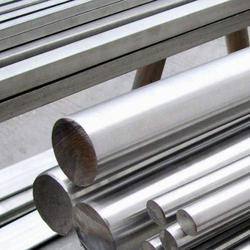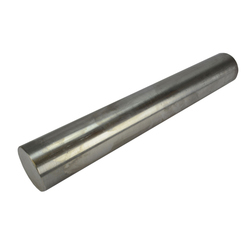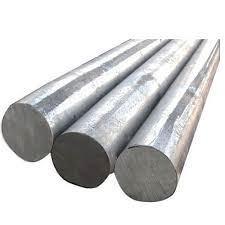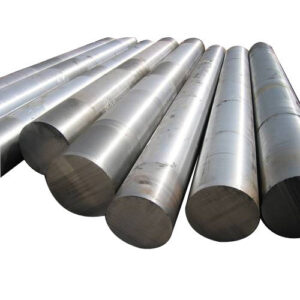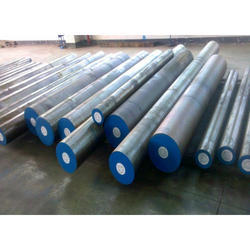EN45 is a manganese spring steel. That is to say, it is a steel with a high carbon content, traces of manganese that effect the metal’s properties, and that it is generally used for springs (such as the suspension springs on old cars). It is suitable for oil hardening and tempering. When used in the oil hardened and tempered condition EN45 offers excellent spring characteristics. EN45 is commonly used in the automotive industries for the manufacture and repair of leaf springs. Tempered EN45. The typical re-enactor’s weapon is made from hardened and tempered EN45. These weapons are made by professional smiths, and their properties depend substantially on the skills and choices made by the smith. Much depends on the hardness to which the blade is tempered. The Rockwell scale is generally used as a measure of this hardness. I believe that at the present date most UK armourers temper to between 52 and 54 on this scale. Harder blades are more likely to suffer from chips and breakage, while softer blades are more likely to bur and require more frequent maintenance. To begin with all tempered swords swill pick up more damage than they will later in their life. This is because of the process of work hardening: every blow compacts the metal on the edge of the sword making it more resistant to future blows.
Applications:
- EN45 is used widely in the motor vehicle industry and many general engineering applications.
- Typical applications include leaf springs, truncated conical springs, helical springs and spring plates.
Forging:
- Preheat the EN45 carefully, then raise temperature to 1050°C for forging.
- After forging cool slowly, preferably in a furnace. Soak for 1 hour at 2150 F (1177 C) prior to forging.
- Do not work below 1850 F (1010 C). Post-work solution treatment is required prior to final hardening.
Annealing:
- Heat slowly to 640-680°C, soak well. Cool slowly in the furnace.
Tempering:
- Temper the EN45 spring steel immediately after quenching whilst tools are still hand warm.
- Re-heat to the tempering temperature then soak for one hour per 25 millimetre of total thickness (2 hours minimum) Cool in air.
- For most applications tempering will be between 400-550°C.
Heat Treatment:
- Heat treatment temperatures, including rate of heating, cooling and soaking times etc. will vary due to factors such as the shape and size of each component.
- Other considerations during the heat-treatment process include the type of furnace, quenching medium and work piece transfer facilities.
Welding:
- We recommend you contact your welding consumables supplier who should provide you full details and information on welding EN45 spring steel.
Chemical composition:
| Grade | Min % | Max % |
|---|---|---|
| Carbon, C | 0.50 | 0.60 |
| Manganese, Mn | 0.70 | 1.10 |
| Silicon, Si | 1.5 | 2.0 |
| Nickel, Ni | -.– | -.– |
| Molybdenum, Mo | -.– | -.– |
| Chromium,Cr | -.– | -.– |
| Sulfur, S | -.– | 0.05 |
| Phosphorous, P | -.– | 0.05 |
Material Properties:
| Ultimate tensile strength, S. (Mpa) | 621 |
|---|---|
| Modulus of elasticity, E (Gpa) | 204 |
| Fatigue strength coefficient, of (Mpa) | 948 |
| Fatigue strength exponent, b | -0.092 |
| Fatigue ductility coeffient ,ef | 0.26 |
| Fatigue ductility exponent,c | -0.445 |

